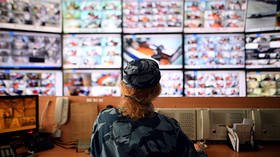Thought police: Russian law enforcement seeks funding for development of $720 million 'virtual brain' to help catch criminals

It may sound like the stuff of science fiction, but Russia’s Ministry of Internal Affairs has requested funding for a new project that would use so-called neural networks to help identify those involved in crimes.
The plans were presented at a strategic session chaired by Deputy Prime Minister Dmitry Chernyshenko last week, with officials seeking more than 55 billion roubles (almost $720 million) to fund the scheme.
According to the project’s roadmap, the artificial intelligence tool, which supposedly mimics the way the human brain operates, will be used to help search for repeat offenders. The ministry promises that it has the potential to “determine the individual anatomical features of a person, obtained by using biological material from the crime scene.” These reconstructions, possibly based on a drop of blood or a single hair, could then be used like a photo-fit to support a police manhunt.
Also on rt.com They love Big Brother? Majority of Russians support using facial recognition cameras to identify those in contact with Covid-19Russia is already using AI facial recognition software to help enforce the law, and Moscow has one of the largest networks of these systems in the world, receiving data from 105,000 cameras. In April, international outlets reported on how the country is using technology to identify those breaching coronavirus regulations, determining when those who are supposed to be self-isolating leave their homes. AI is also used to help identify and track down drivers who break the rules of the road.
Neural networks and other computing tools are increasingly being used by police forces across the world, including in Europe, the Americas and Asia. Chinese police, who operate one of the most sophisticated systems in existence, succeeded in identifying a wanted man from among a sea of people in a stadium, according to a report by Forbes. Without facial recognition, this would have been virtually impossible.
Russia has massively increased spending on law enforcement over the past 15 years as its economy has grown, with the country now allocating more than two trillion roubles ($26 billion) to police and security forces across the country. According to the prosecutor general, there has been a sustained drop in serious crimes like homicide and drug trafficking over that period.
If you like this story, share it with a friend!














